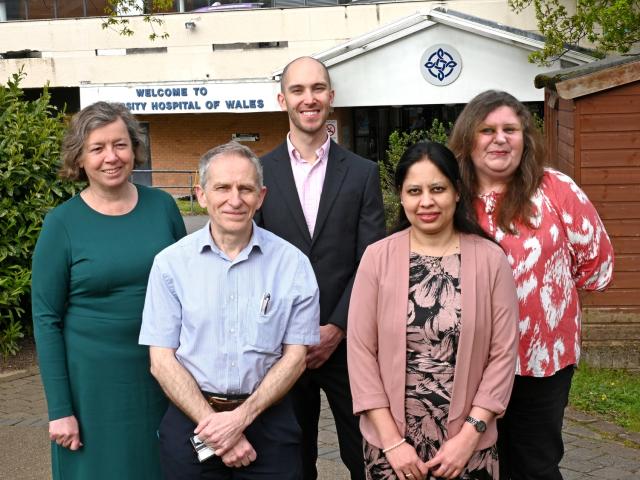
Study leads to new testing guidelines for adults with diabetes in Wales
2 June
To mark Diabetes Awareness Week (9-15 June), Health and Care Research Wales is celebrating the success of an internationally-acclaimed research study led by Cardiff and Vale University Health Board, which has improved diagnosis guidance for adults with diabetes in Wales.
Wales has the highest prevalence of diabetes of any UK nation, with over 200,000 living with the condition. Diabetes causes a person’s blood glucose to become too high, either because they do not produce the hormone insulin (known as Type 1 diabetes), or they do not produce enough of it, or are unable to process it correctly (Type 2 diabetes).
People with Type 1 diabetes need to closely monitor their blood glucose and inject insulin multiple times a day, which can have long-term implications for patient’s quality of life. In comparison, some cases of Type 2 diabetes can be managed through a combination of diet, exercise and oral medications.
The study investigated whether a new C–peptide test, previously piloted by a group in Edinburgh, could improve the accuracy of diagnosis by reclassifying some patients as having Type 2 diabetes, rather than Type 1.
C-peptide is a biomarker which can show how much insulin someone has in reserve. The Endocrinology team at Cardiff and Vale University Health Board sought to establish whether patients whose blood samples showed a C-peptide concentration above a certain level could be supported to reduce or even stop their daily insulin injections, improving their long-term quality of life.
The study evaluated almost 400 patients, 36 of whom went on to be reclassified as having Type 2 diabetes. 21 individuals were supported to stop their insulin completely, leading to improved glucose control, BMI and self-reported quality of life.
The study has since led to the development of C-peptide testing guidelines for adult patients with diabetes across Wales, which are now in use in all hospitals. It also received a distinction in the global UNIVANTS of Healthcare Excellence programme.
Dr Arshiya Tabasum, lead researcher and Endocrinologist at Cardiff and Vale University Health Board, said,
By incorporating C-peptide testing into clinical practice, we have been able to establish a more precise diagnosis of diabetes, provide patient-centered treatment and safe and effective withdrawal of insulin, enhancing the quality of life for our patients.”
Professor Steve Bain, Health and Care Research Wales Specialty Lead for Diabetes, said, “Diabetes is a complex condition which requires careful daily management. Research like this will make a have a tangible impact for the many thousands of people living with diabetes in Wales, as well as for patients in the future.”